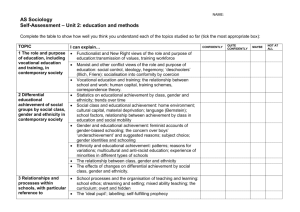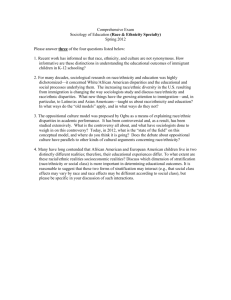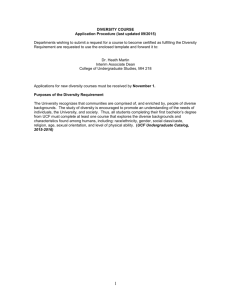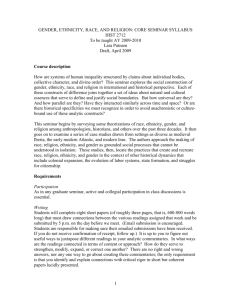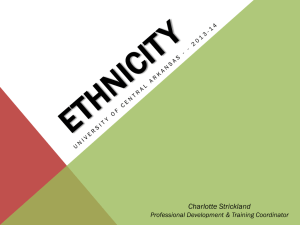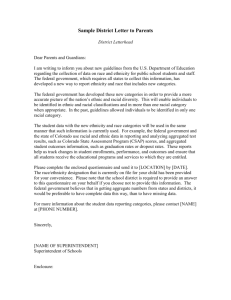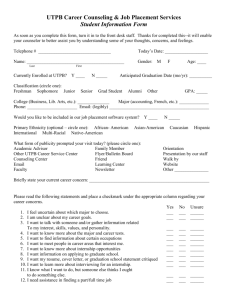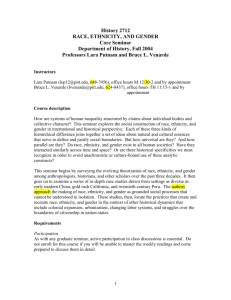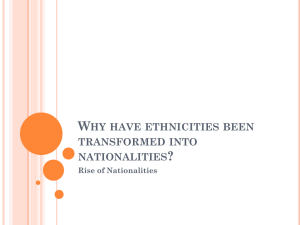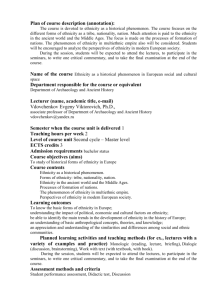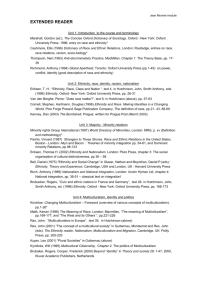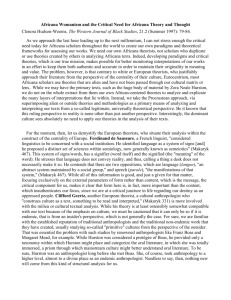Conversations on Race, Ethnicity and Identity Teaching Cirlcle
advertisement
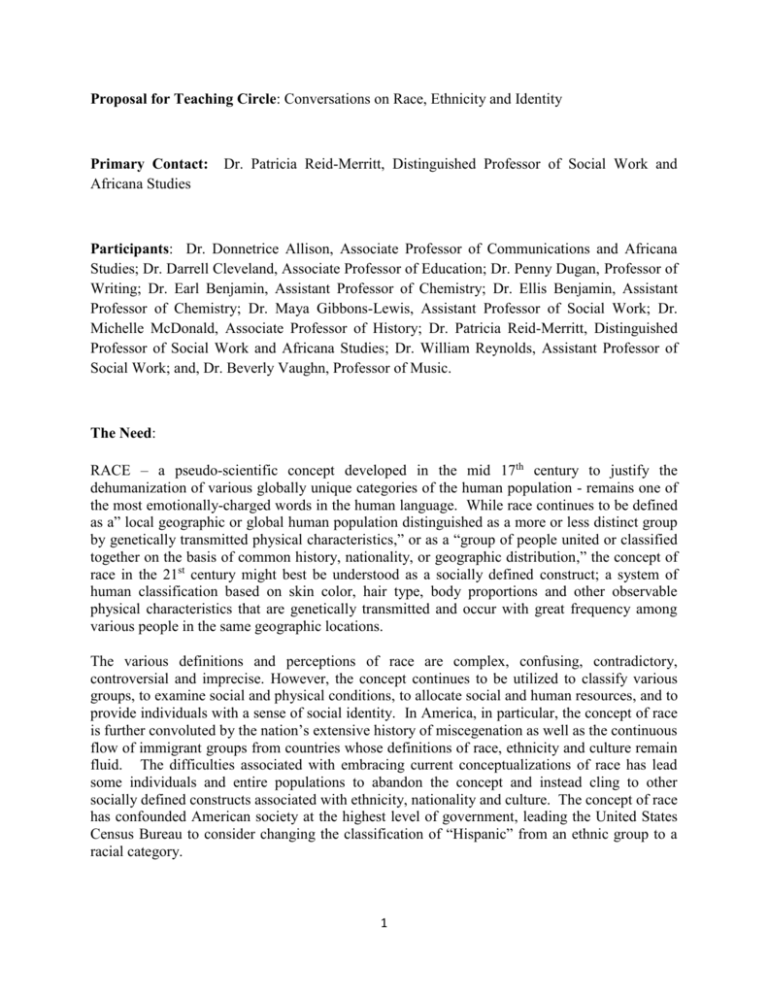
Proposal for Teaching Circle: Conversations on Race, Ethnicity and Identity Primary Contact: Africana Studies Dr. Patricia Reid-Merritt, Distinguished Professor of Social Work and Participants: Dr. Donnetrice Allison, Associate Professor of Communications and Africana Studies; Dr. Darrell Cleveland, Associate Professor of Education; Dr. Penny Dugan, Professor of Writing; Dr. Earl Benjamin, Assistant Professor of Chemistry; Dr. Ellis Benjamin, Assistant Professor of Chemistry; Dr. Maya Gibbons-Lewis, Assistant Professor of Social Work; Dr. Michelle McDonald, Associate Professor of History; Dr. Patricia Reid-Merritt, Distinguished Professor of Social Work and Africana Studies; Dr. William Reynolds, Assistant Professor of Social Work; and, Dr. Beverly Vaughn, Professor of Music. The Need: RACE – a pseudo-scientific concept developed in the mid 17th century to justify the dehumanization of various globally unique categories of the human population - remains one of the most emotionally-charged words in the human language. While race continues to be defined as a” local geographic or global human population distinguished as a more or less distinct group by genetically transmitted physical characteristics,” or as a “group of people united or classified together on the basis of common history, nationality, or geographic distribution,” the concept of race in the 21st century might best be understood as a socially defined construct; a system of human classification based on skin color, hair type, body proportions and other observable physical characteristics that are genetically transmitted and occur with great frequency among various people in the same geographic locations. The various definitions and perceptions of race are complex, confusing, contradictory, controversial and imprecise. However, the concept continues to be utilized to classify various groups, to examine social and physical conditions, to allocate social and human resources, and to provide individuals with a sense of social identity. In America, in particular, the concept of race is further convoluted by the nation’s extensive history of miscegenation as well as the continuous flow of immigrant groups from countries whose definitions of race, ethnicity and culture remain fluid. The difficulties associated with embracing current conceptualizations of race has lead some individuals and entire populations to abandon the concept and instead cling to other socially defined constructs associated with ethnicity, nationality and culture. The concept of race has confounded American society at the highest level of government, leading the United States Census Bureau to consider changing the classification of “Hispanic” from an ethnic group to a racial category. 1 Those of us teaching about race face many challenges. We struggle with how we use and define the concept; how we transmit our understanding of both the historical significance of race as well as its contemporary consequences; and how we foster an understanding and appreciation of racial history, heritage and identity without bias, shame, embarrassment and intimidation. How do groups embrace, and attempt to preserve, their own heritage without offending others? How do you teach about racial pride – and to whom? And while ethnicity, culture, nationality, identity and multiculturalism are all significant concepts that are essential to any discussion or conversation on human groupings, race remains the fundamental, unavoidable question that serves as the initiating point, and it must be addressed, honestly and forthrightly. The Participants Faculty members (currently 10) who are interested in further developing their expertise on teaching about race are representative of a variety of disciplines and schools at Stockton. Indeed, race is a multidisciplinary concept that is continuously explored in course offerings in history, politics, biology, art, music, social work, psychology, political science, religion, communications, English, and education. As scholars and teachers, we are interested in developing this Circle as a mechanism to share our understandings of race, ethnicity and associated concepts; exchange information on teaching methods; and, explore challenges brought forth by today’s multiracial, multiethnic and multicultural student population. Method/Time Frame The Conversations on Race, Ethnicity and Identity Circle is planned for spring, 2013. Five (2 hour) sessions are scheduled: 1. 2. 3. 4. 5. Defining Race Race, Ethnicity and Culture Pedagogical Approaches to Teaching Course Content on Race Emotional Response and Student Resistance to Conversations About Race Race, Ethnicity and Identity Within the National and Global Context The self-facilitated group would engage in a variety of methods to foster interactive, enriching conversations on each topic, including: (1) the anecdotal experience (bringing forth personal experiences based on years of teaching content on race); (2) shared readings (“How Race is Lived in America,” NY Times series (2000); Race Migrations: Latinos and the Cultural Transformation of Race, Roth, 2012; Race Matters, West, 2001; Bengali Harlem and the Lost Histories of South Asian America, Bald, 2013) (3) video/film viewings (“Who is Black in America,” CNN, 2012; “Latino in America,” CNN 2009; Django Unchained, 2012; Lincoln, 2012); Guest participant (Dr. Mark Christian, Professor and Chair, Department of African and 2 African American Studies, Lehman College, CUNY, author, Multiracial Identity: An International Perspective (Palgrave, 2000). Dissemination: A Paper is planned for release at the conclusion of the sessions – targeted date of June 30th 2013. All participants will share in the responsibility of producing the final paper and will share in a small stipend to assist them in completing the work on time. Additionally, Dr. Patricia ReidMerritt is planning to attend The Frederick Douglass Institute Collaborative - Ghana Interdisciplinary Conference Diversity and Multiculturalism in the Global Educational Community, as both participant and presenter, at the University of Cape Coast, Ghana, May 22 to 24, 2013 (Travel Dates May 19 through May 27). We envision the Circle on Conversations on Race, Ethnicity and Identity as a starting point and believe that this initial circle will result in on-going conversations within Stockton and the broader community. Budget Books/Reprints 650.00 External Participant (Dr. Christian) 600.00 Shared Stipends (10 @ 150.00) 1500.00 Conference registration/travel (partial) 1250.00 ________ Total 4000.00 3
